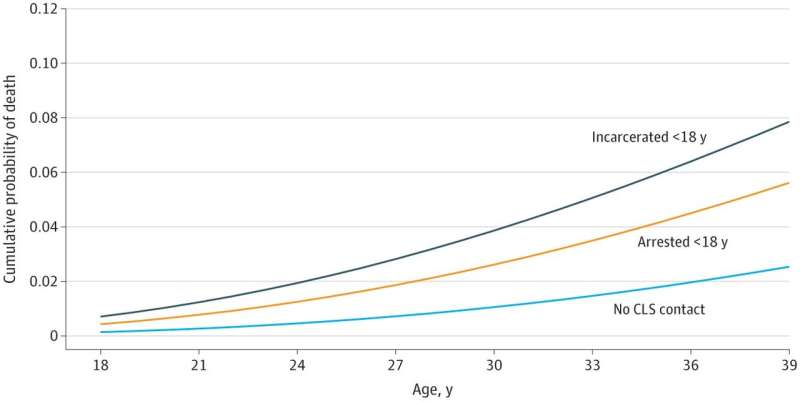Youth placed in adult prison have their lives cut shorter, study says

A University of Cincinnati co-authored study found that in the U.S. youth who are incarcerated in adult correctional facilities are at a 33% higher risk for an early death between the ages of 18 and 39. The study, published in JAMA Open Network, also found that formal encounters with the legal system put youth at risk for a shorter lifespan during those same years.
"We've known for a long time that youth who spend time in adult prisons have a wide range of negative health-related outcomes; however, whether such experiences affected mortality had not yet been tested," says study co-author Joseph Nedelec, an associate professor in UC's School of Criminal Justice.
In what Nedelec calls the first known study of its kind, he and fellow researchers from RTI, a nonprofit research institute, and Rutgers University, Camden, New Jersey, analyzed data from the National Longitudinal Survey of Youth 1997.
The study involved a random sample of 8,951 individuals born in the United States between 1984 and 1987, who were first interviewed in 1997. The interviews continued until 2019. A total of 109 participants were incarcerated as youth in adult facilities and 225 participants died during the study period and were between the ages of 18 and 39.
Main finding
According to Nedelec, the main finding of increased risk of death by 33% held fast even after accounting for general risk factors such as health, family background, socioeconomic status and whether the individual died while incarcerated or not.
In most U.S. states, youths can be transferred and sentenced in adult court, resulting in detention in adult jail or prison facilities. Incarceration in juvenile versus adult correctional facilities represents vastly different experiences. Adult facilities are often much larger and place less emphasis on treatment, counseling and education. Incarcerated youths often experience health challenges related to dental care, sexual and reproductive health and mental well-being.
"The adult prison system is not designed for the crucial development years of adolescence," says lead author Ian Silver, Ph.D., a quantitative criminologist at RTI who earned his Ph.D. in criminal justice at UC in 2019. "Within such a system youths may not only engage in risky behaviors, but they may directly experience risk factors associated with the likelihood of early mortality, including increased risk for violent victimization, substance use and disease."
Holding youths in adult prisons "is not only problematic, but it may also be lethal," says UC's Nedelec, adding that youth incarcerated in juvenile facilities did not illustrate the same increased risk of early mortality.
Secondary finding
While being incarcerated in an adult facility as a youth evidenced a high risk for early mortality, the study also found that any formal contact with the legal system was associated with an increased risk of premature death by 18% between 18–39 years of age.
Per the study, formal contact is defined as an arrest, but can also be an arrest and release.
"It appears any formal contact with the legal system as a youth increases the risk of early mortality, relative to no contact with the legal system," says Nedelec.
More information: Ian A. Silver et al, Incarceration of Youths in an Adult Correctional Facility and Risk of Premature Death, JAMA Network Open (2023). DOI: 10.1001/jamanetworkopen.2023.21805
Journal information: JAMA Network Open
Provided by University of Cincinnati Study finds high mortality rates of youths previously incarcerated in the juvenile legal system
No comments:
Post a Comment